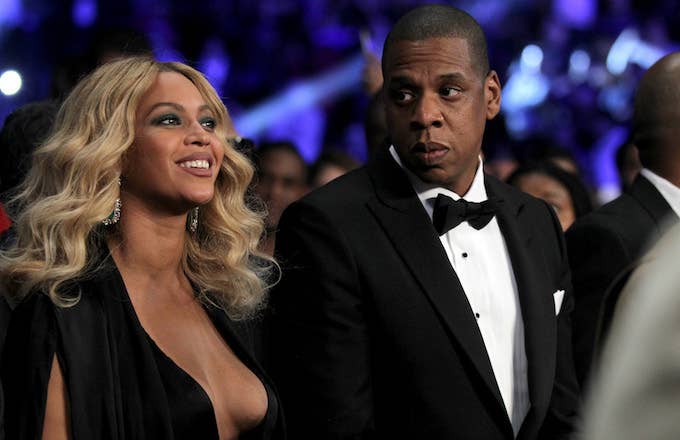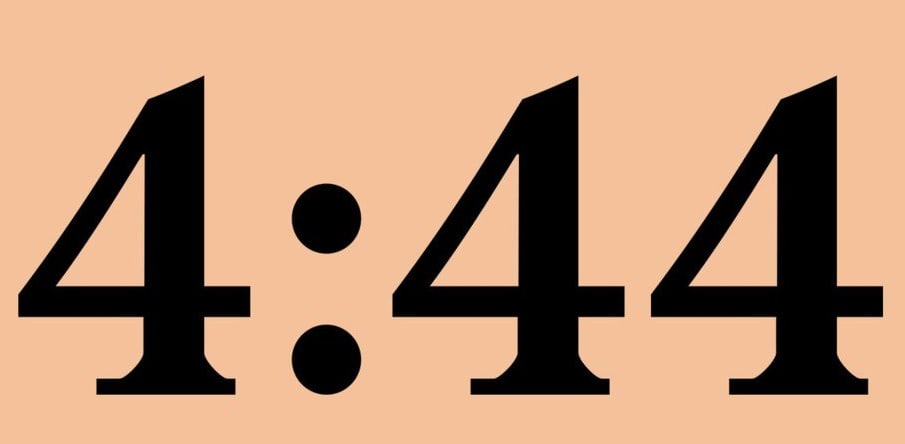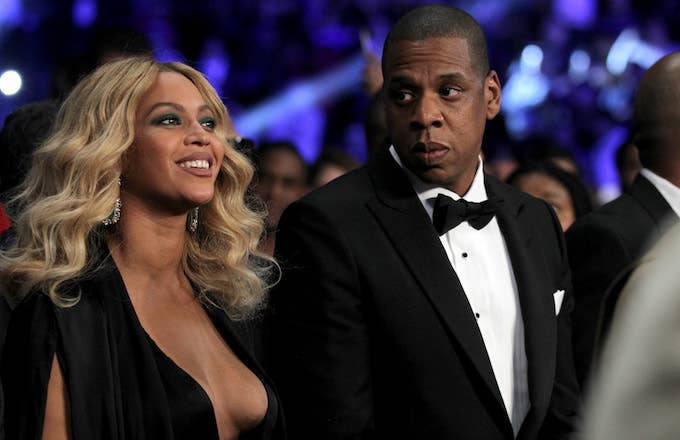
Over the past 400 years or so, black folks in America have gotten good at hiding secrets in our culture and in our art. Sometimes out of survival—folktales, intricate grammar, rapping—and sometimes for sheer joy (and also: survival)—folktales, cakewalks, intricate grammar, rapping—the things we put out into the world, from the high to the lowly, often necessarily work on multiple levels at once. The things we say, the expressions we make and glances we give, the words we write, the sounds we produce are strewn with talking easter eggs that connote otherwise meanings, otherwise events, otherwise works, otherwise histories, and otherwise persons (some long gone). In my field we call them intertexts. And the act involved is called signifyin(g). Jay Z is a master of it.
While culture-at-large has a long way to go in terms of attuning themselves to the complexities of black culture and speech (and may I pray they never get there), rap music seems to be the one place many are willing to give it the old college try. We’re in an era where an entire album’s lyrics are put online with the quickness, and a site like the popular Genius.com (formerly Rap Genius) encourages everyone to find their inner scholar and excavate hidden meanings, one lyrical phrase at a time.
4:44 makes for a tempting project. Cheekily referred to as “Jay Z’s Lemonade,” 4:44 is the B-side to Beyoncé’s 2016 Peabody Awarded and platinum-selling album and film, to the extent that it is the other side to her story—the two-timing man who almost (and briefly did) break up a family to the woman encumbered by the emotional fallout. Even aside from the mutual event (events? It’s unclear) that bind the two sonically disparate projects, Lemonade and 4:44 share parallel themes about black cultural inheritance—what’s been passed down (behaviors, ideas, politics, trauma) and what gets left behind (wealth, knowledge, love). Both albums have an “I” and a “you,” but only Lemonade (the album) has a Bey and only 4:44 has a Jay, and both have a Becky (“Sorry” and “Family Fued”). And both albums are grown af.
4:44 comes from the person who done wrong and that type of story, if honestly told, refuses to allow any places to hide.
Anyone searching for easter eggs amongst Jay’s rhymes in 4:44 will most certainly find them. Lyrics about Eric Benét (“never go Eric Benét”), Kanye (“Niggas is skippin’ leg day just to run they mouth”), Future (“other niggas playin football with your son”), and more have lit a fire across the internet. Many sites (including this one) generated entire articles dedicated to parsing out the juiciest bits of info, not unlike Lemonade’s own Becky-gate. Listeners have even pointed out what looks like a definite chronological convergence between the two: early on Jay Z’s “4:44” he begs “Please pick up the phone” while the opening lyrics of Beyoncé’s “Sorry” assert “I ain’t pickin up.” Even a fake lyric got swept up in the fever, an alleged potshot at Kim Kardashian that doesn’t actually occur anywhere on the album.

This social mischief is understandable and expected—celebrity gossip is really entertaining and celebrity feuds even more so. Meanwhile, as the Carters are wont to do, Jay has been relatively absent outside the work itself. He did have an exclusive sitdown with iHeartRadio to talk about the work, but his explanations of the album’s inspirations are brief and vague. The song “Legacy,” for example, “is just about what it is, it’s like a verbal will,” he says. And “Smile” “just is what it is.”
While not the first or only time an artist comment has been less than illuminating (and many artists are notoriously bad about explicating their own work), Jay’s comments suggest that like most, if not all, musical projects, parsing happens at the place of listening and need to be heard to understood. Additional commentary for the album comes in the form of two Tidal-exclusive playlists—“4:44 Inspired by,” with songs and artists who helped inform his vision, and “4:44 Samples,” with directly incorporated works. There’s a leashed challenge there, against the kind of aggressive digging that has entertained the blogs, the forums, and Genius since Friday at 12:00 a.m. EST. And for an album like 4:44 such a challenge would make sense. Giving everything it has, 4:44 questions the efficacy of such practices. Sort through the petty all you want, the album taunts. At the end of the day, it’s pain all the way down.
For there is another major difference between his and hers (besides, again, the fact they sound nothing alike and are entirely different genres of music). While Lemonade grows all the richer for an exploration of the vast intertexts accumulated under every beat, every camera angle, every fashion choice, 4:44 just isn’t the same type of artifact. This is not a negative criticism of the latter album, but rather a formal quality borne out of perspectival differences. 4:44 comes from the person who done wrong and that type of story, if honestly told, refuses to allow any places to hide. Sometimes interiority is selfish. Those who plumb the lyrics for gossip at the expense of their own emotional interfacing with the album seem to have missed the point. The Jay of 4:44 knows there is no inside to making pain when the wounds occur on someone else’s body.
My story’s too wide to fit inside a line or two.
Anyone with an empathetic heart, that is anyone with empathy for black women (without which I would certainly call such a person heartless), will feel uncomfortable listening to this album. Such is the genre of the confessional. It is not fun to bare one’s soul, no, and even less fun to bear witness to it. Beloved Chicagoan producer No I.D. eases the experience somewhat, remixing past and present with samples from Kool & the Gang, the Fugees, the Alan Parsons project, Stevie Wonder, and many more. Each song has its own reckoning and even potent samples from Nina Simone (“The Story of O.J.”) and gospel vibes (“Family Feud”) cannot distract from the somber truths behind the mic, nor, I believe, would either want them to. “He told me he wanted to open up and give people more,” No I.D. told The New York Times’ Joe Coscarelli. “But there’s a difference in talking about it for the sake of response and for the sake of response and for the sake of honesty and the truth… We know what happened. We got it. But what were the circumstances that led to this and how did you feel about it?”
"Sort through the petty all you want, the album taunts. At the end of the day, it’s pain all the way down.
If the process of recording 4:44 was therapeutic for Jay—though not a surrogate for actual therapy; he raps about his real-life therapist on “Smile”—as listeners, our access to his life is newly encumbered by the weight of 1000 emotion-laden ships. “Kill Jay Z” begins in media res, with beats and background noise primed to put a listener on edge. While “not to be taken literal,” according to the man himself, it is sorely earnest. “Kill Jay Z” sidesteps the kind of irony that might temper its judgement—making it something of a foil to the ultimately fun (if still uncomfortable) “I Love Kanye,” from The Life of Pablo. Instead, the song marks a beginning that “initiates absolution,” as Doreen St. Felix writes for The New Yorker, “representing a foundational admission of sin that allows him to chase redemption for the rest of this tightly conceptualized project.”
It’s a rough journey. “4:44,” the obvious cornerstone of the album, hurts to listen to, at least the first few times. It’s remorseful, even embarrassed, and incredibly intimate. The “you” is never named, but to echo No I.D., we know that already. There’s plenty we didn’t know before, though, about a relationship that was ultimately never picture perfect from the start. Jay unearths the unsavory truths over and between the vocals of Houston-born gospel songstress Kim Burrell, whose slightly grained ululations cycle relentlessly in the background. The pauses between verses are prolonged, the rhymes within are sparse. Whether we want to believe the mythos around its creation is quite immaterial—the song sounds and feels like the professed thoughts of a haunted insomniac. It’s an experience I dread with each listen, but the rest of the album feels unearned without it.
All the tracks have a confessional residue of this kind, sandwiched between other passionate revelations about his peers, black culture and identity, family, ownership, racism, and plenitude. The only times that constitute a breather are when Jay shifts to a pedagogical mode and his subject moves from “I”/“you” to other people, including us. It’s a more familiar type of truth-telling from Jay, a truth-to-power rap remains famous for. On “Smile,” he returns to the subject of blood diamonds (“All y'all jewelers should be embarrassed/Blood diamonds drippin, we cute”) and laments the challenges (structural and self-inflicted) that prevent black folks from becoming purveyors of their own markets and creations. On “Caught Their Eyes” he lets the puns fly while calling out the way black artists have been posthumously preyed upon, Prince in particular (“You think he wanted the masters with his masters?”). Frank Ocean, more than familiar with this phenomenon in life, supplies the vocals. “Family Feud” layers a cultural family atop a nuclear one, fantasizing about a future that would truly be all-black-everything. “Moonlight” worries we might never get there. “Legacy” assures us, with Donny Hathaway’s assistance, that yes, indeed, we will.
“The Story of O.J.” is the only song with a music video so far, with more allegedly on the way. Visualizing the not-so-antiquated racial tropes recited in the hook, the black-and-white animated short is reminiscent of the animation industry’s debt to blackface minstrelsy. Jay himself is rendered into a character named Jay Bo, fitted in the Jump Jim Crow attire observed in the costumes of classic cartoon characters like Bimbo the dog (from Betty Boop), Mickey Mouse, and Bugs Bunny—gloves, hat, patent shoes. Besides the array of enduring types like Mammy, Jezebel, and the uppity Zip Coon, the film includes the specific iconography of Dumbo, Sarah Baartman, the confederate flag, Huey P. Newton, the KKK, Nina Simone, and the US Navy. The video is accompanied by a separate longer video of “Footnotes,” with footage of Jay, Chris Rock, Van Jones, Kendrick Lamar, Michael B. Jordan, Mahershala Ali, Will Smith, and other black men discussing the themes of the song and video.
4:44’s prescription for liberation and repair is far from perfect. We may and rightly should critique Jay’s boundless faith in the machinations of an economic system that was never built to take black survival, let alone black thriving, into consideration. Regardless, by the end of the album, we can have no doubt what led him to making it, what he feels, and why. 4:44 never promised to be flawless, only human and on that point it delivers. Pulsing, jagged, with dreams so big they hurt, 4:44 gives us the Jay we maybe didn’t want, but absolutely needed to see.

